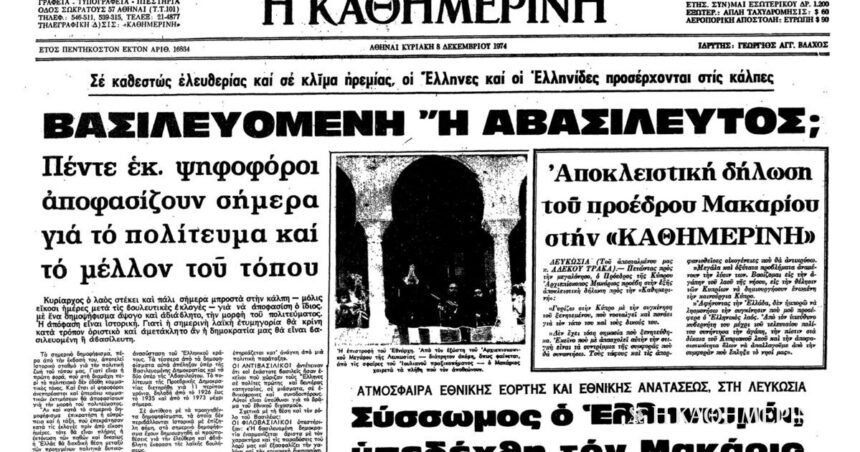The 8th of December 1974 is an important date in the modern history of Greece, because with the referendum that was held, the state issue was resolved. As “Kathimerini” of December 8 points out, “today’s referendum […] is a historical station”.
With the fall of the junta of the colonels and the assumption of the government of the country by the Government of National Unity under Konstantinos Karamanlis, the Constitution of 1952 came back into force, with the Constitutional Act of August 1, 1974, except for the fundamental provisions, which concerned the form of the polity as a Reigning Republic. Until then, the head of state would continue to be general Phaedon Gizikis, the junta President of the Republic.
It had been decided that the final solution to the state issue would be through a referendum, after the parliamentary elections, which were set for November 17th. Indeed, a few days later, on November 22, the day after the swearing-in of the first elected government, the relevant Presidential Decree was issued, stipulating that the holding of the State referendum would take place on December 8. The Greek people would decide both the return or not of Konstantinos, who remained in exile, after his failed movement against Georgios Papadopoulos, which led to the abolition of the monarchy with the Junta “referendum” of July 29, 1973, and for way of selecting the head of state.
Characteristic of the period before the holding of the referendum are the televised debates that took place. Apart from Konstantinos himself, who was not allowed to enter the country, and thus had to communicate his views to the Greek people through televised messages – on November 26 and December 6 –, other important personalities also participated. Marios Ploritis, Phaedon Vegleris, Georgios Koumantos, Alekos Panagoulis, as well as Kostas Simitis stand out among those who openly stood in favor of de-reigned democracy. However, the absence of party color and “direction” was particularly important. Prime Minister Konstantinos Karamanlis, on November 23, 1974, had asked, for example, the members of the New Democracy Parliamentary Group to maintain a neutral position on the state issue, since on the one hand there was a percentage of voters who were in favor of the monarchy, and on the other the other was the ruling party. As pointed out in the relevant article of “Kathimerini”, “this is the first time that the dispute over the state was not given a partisan tone. And so the voters, uninfluenced and above party considerations, will decide on the form of the polity. […] passions will be fully released and Greece will rightfully claim a place among the politically advanced Western European democracies”.
The result of the ballot clearly showed the preference of the Greeks in favor of de-reigned democracy. The specific percentage reached 69.18% – with Crete leading the way with percentages in favor of the queen that exceeded 80% of the votes -, while 30.82% of the citizens voted in favor of the reigning democracy. Abstention reached a total of 25%.
There was no questioning of the result on the part of Konstantinos, while the prime minister spoke of a final end to the pendency of the Politioko that had plagued modern Greece for many decades.
On December 15, Phaidon Gizikis resigned and three days later, the Parliament elected temporary President of the Republic, Michael Stassinopoulos, Member of Parliament of the New Democracy and former judge, after the refusal of the former Prime Minister Panagiotis Kanellopoulos to come down as an ultra-partisan. The first elected President of the Hellenic Republic would be Konstantinos Tsatsos on June 20, 1975.
Column editor: Myrto Katsigera, Vassilis Minakakis, Antigoni-Despina Poimenidou, Athanasios Syroplakis





